Javier Salinas, Partner, International Tax at BPM, is a distinguished international tax advisor with over 21 years of experience. Clients rely on Salinas when navigating complex cross-border tax planning and structuring multinational operations. His clients range from startups to global, multinational companies in a wide spectrum of industries, including technology, Blockchain and digital assets, e-commerce, FinTech. In this article, Salinas shares his insights on what’s next for crypto and tokenisation.

After years of ‘regulation by enforcement’ in the US through SEC inquires and lawsuits, recent signals from Congress suggest bipartisan interest in establishing clear crypto regulations, including stablecoin oversight, investor protections and taxation frameworks. Clearer laws could further boost institutional and retail adoption.
Other countries (e.g., UAE, EU Member States and Singapore) have already developed comprehensive crypto frameworks. The US risks falling behind in innovation without a more supportive regulatory environment concerning digital assets.
Regarding the incoming US administration, the crypto-friendly nominees are numerous and will assume roles in critical agencies directly influencing policies focused on digital assets.
The US has the unique opportunity to leverage aspects of other countries’ established regulatory frameworks while focusing on improving on perceived shortcomings from an industry perspective. The US government’s focus on this opportunity, the industry expertise that will form part the incoming administration, and direct lines of communication being established with leaders in the crypto industry, puts the industry in a unique position for progress and advancement like never before.
Further positive developments would directly lead to a significant influx of investment into US-based crypto projects. The discussion necessarily shifts at that point around the world from which jurisdictions support the industry and crypto investment to which ones have the best offering for what a company, fund or other project seeks to accomplish in the crypto industry. The incoming administration seems poised to make sure the answer to any project or investment consideration is to be based or invested in the US.
Accounting standards
Private industry will also be incentivised to establish corporate treasury allocations to Bitcoin. The Financial Accounting Standards Board’s updated accounting standards (which took effect for tax years beginning after December 15, 2024) to introduce fair value measurement requirements and enhanced disclosure obligations, changing how businesses report digital asset holdings.
This shift allows companies to reflect real-time market values for Bitcoin and other digital assets on their financial statements, reducing the previous impairment-related complexities and enabling more transparent and accurate reporting of gains and losses. As a result, businesses may be more inclined to hold BTC on their balance sheets, boosting adoption among public and private companies while improving investor confidence through clearer financial disclosures.
Integration of AI and Blockchain to drive innovation
The integration of AI and Blockchain technology is creating new opportunities. This convergence of the Internet of Things (IoT) addresses critical challenges in data integrity and operational efficiency while democratising access to AI capabilities. Smart contracts traditionally follow predefined rules. We are likely to see the integration of AI, potentially leading to the evolution of smart contracts becoming adaptive, learning-based contracts that respond to dynamic and ever-changing conditions.
For example, in the supply chain context, AI-powered smart contracts could analyse real-time shipping, weather and supplier data to dynamically adjust delivery terms or pricing. Alternatively, in the DeFi (Decentralised Finance) context, AI could optimise interest rates or liquidity provision based on market conditions and real time financial and business data of lenders.
We are likely to see the integration of AI agents into Decentralised Autonomous Organisations (DAOs) to make autonomous, data-driven decisions on Blockchain networks. The current operational practice typically involves active analysis and management by the DAO directors or those engaged to carry out the DAO’s daily functions. These functions include proposing governance decisions to the community of token holders in the DAO. Incorporating AI agents into this ecosystem will offer a more efficient mechanism to analyse on-chain and off-chain data to propose governance decisions (e.g., portfolio management, token issuance) or carry out more complex tasks without human intervention on the functions assigned to the AI agent.
Tokenisation of real-world assets (RWAs)
The tokenisation of RWAs, such as real estate, stocks and commodities, is expected to see continued growth in 2025. According to a Bernstein report, tokenisation represents a US$5 trillion opportunity in the next five years. This trend involves the process of fragmenting an asset into digital tokens that represent the underlying property with all its rights and obligations, allowing for greater liquidity and accessibility. Investors can diversify their portfolios by holding fractions of high-value assets, creating opportunities for fractional ownership and easier trading. As a recent report from the Federal Reserve notes: ‘Among the benefits of tokenisation, lowering barriers to entry into otherwise inaccessible markets and improving the liquidity of such market are the most prominent.’
As illustrated through the example of tokenisation of fractional real estate interests, the opportunities and access created by investing in real estate through tokenised interests are groundbreaking in the industry.
Lower barriers to entry
For many unable to financially contribute a significant down payment or overcome the barriers to entry created by high interest rates on mortgages for the purchase of an investment property, tokenised real estate interests allow entry to true ownership for literally a fraction of a dollar.
Liquidity
Tokens representing the fractional ownership of real estate interests can be bought and sold at any time, and the token holder has the right to participation in the value generated from property appreciation. Lending pools may also be available on platforms allowing token holders to either stake their property tokens, stablecoins or both.
This liquidity pool may be managed by an algorithmic market maker that buys and sells property tokens for stablecoins. This function offers the ability to buy and sell ownership in real estate in a process very similar to buying or selling shares of a public company’s stock.
Transparency and automation
Being Blockchain-based, the marketplace provides clear records of ownership and transaction history for all users. And smart contracts streamline compliance and reduce intermediaries in the automated process.
Commodities such as gold or other precious metals, energy resources such as oil or natural gas, and agricultural products also lend themselves well to tokenisation. Collectibles (e.g., artworks, luxury goods and trading cards), intellectual property and royalties (e.g., music royalties, copyright ownership for digital media/films), and currencies (e.g., stablecoins like USDC and USDT) are examples of other assets that can be tokenised creating opportunities that previously never existed.


